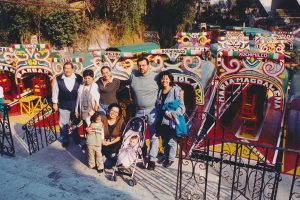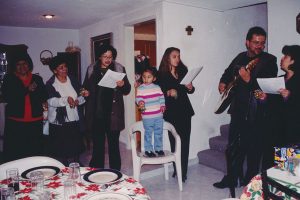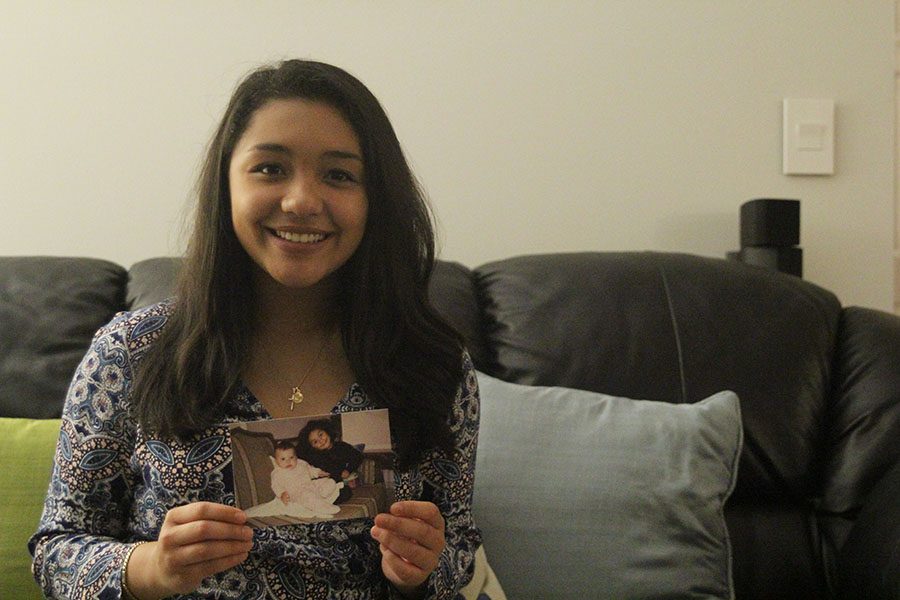Junior Sofia Torres holds a picture of her and her cousin in Mexico while sitting on her couch on Wednesday, Oct. 12. . “I really miss my family. Sometimes I don’t even know what to miss because they were never in my life a lot.”
Junior Sofía Torres-Aranda takes pride in her heritage
Since moving to America from Mexico, Sofía has had to adjust to the American lifestyle
The bell rang, signaling the start of school, and students from French teacher Charisse Highlander’s French III class stood up, placed their hands over their hearts, and recited the Pledge of Allegiance in unison on Monday, Oct. 10. Everyone took part in this weekly routine except for one student, junior Sofía Torres-Aranda, who chose not to stand, but not participate out of respect towards her own heritage.
Since she was born in Mexico City, Mexico and lived in various parts of Mexico for part of her life, Sofía is not an official citizen of the U.S. She believes saying the Pledge of Allegiance is a privilege she should save for when she becomes a full citizen.
“I want to build up for when I become a citizen,” Sofía said. “I’m going to be really proud when I become one.”
As of now, Sofía’s parents have applied for citizenship and will have to pass a test before being granted full citizenship. Being a minor, Sofía will become a citizen once her parents are granted full citizenship.
When she was three years old, Sofía’s parents made the tough decision to move to the U.S. Their decision to move was a result of father Carlos Torres-Garcia receiving a job offer working for Bechtel, an American company. Moving to the U.S. forced the family to make big adjustments along with several tough sacrifices.

“We quit everything that we had in Mexico because we don’t have family in the States,” Carlos said. “We also quit our customs because we needed to learn how to live in the U.S..”
When the family first moved to America, money was sometimes a struggle. Even though they could not always afford leisurely items, Sofía remembered how her parents always made things special for her, especially around the holidays.
“Our Christmas tree was only three feet tall,” Sofía said. “My parents would set it on a box so that it would always be taller than me, making it so I would have to reach to put the star on the tree.”
Upon arriving to the U.S., Sofía’s parents enrolled her in an English speaking daycare program in the hopes that she would begin learning the language. Carlos believed it was best for Sofía to learn English as she matured and adapted to an American lifestyle, despite it being tough on her at first.
“I remember the first three months she came home [from daycare]; she was sad because nobody wanted to talk to her,” Carlos said. “Nobody understood what she was trying to say. The other kids probably thought she was an alien because she was talking in Spanish.”
Discrimination is something Sofía has had to deal with throughout her life because of her Hispanic heritage. In one particular situation, she was going through security at an airport in Chicago with her family when a woman began questioning them based on their physical appearance.
“This lady was giving us instructions and she kept asking if we knew what she was saying, even though we told her we did,” Sofía said. “I started crying because I felt so bad. Just because we look Hispanic doesn’t mean we don’t know English.”
Having frequent contact with friends and family who still live in Mexico made Sofía aware of stereotypes people from Mexico have about those who are from the U.S..
“People from Mexico usually think that if you are from the U.S. you are super rich, which is obviously not the case,” Sofía said. “Of course this is a country with abundance, good money and a good education system, but it’s not like we are swimming in pools of money.”
One Mexican tradition that Sofía and her family have continued to carry is how they celebrate Christmas.

“Christmas is so big. We do things called posadas, which is where people are outside singing songs and they come to every door. Whoever says yes allows the singers to come in and have a party,” Sofía said.
According to Sofía, there are many aspects of American culture that would be frowned upon in Mexican culture, some of which are seen in the classroom.
“I was in APUSH and [social studies teacher Jeff] Wieland just threw the papers at us,” Sofía said. “It’s considered very rude to toss something at someone without telling them.”
Even though she is only a junior in high school, Sofía’s experiences from both traveling and living in Mexico have exposed her to issues going on in the world.
“I’ve seen poverty up close, which is an experience a lot of people don’t have,” Sofía said. “If people [saw] those things, they [would] be more open and [less] ignorant to situations that go on outside of where they live.”
Despite having lived in the United States for most of her life, Sofía takes pride in her culture.
“I am super proud of my heritage. There’s something beautiful within it,” Sofía said. “I wouldn’t want to be anything else.”
